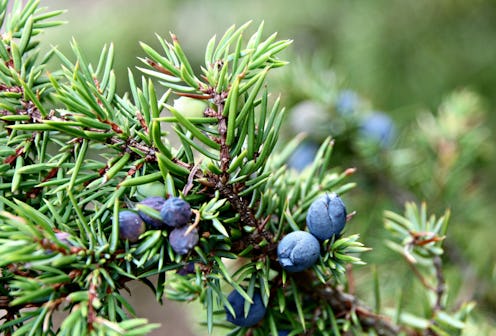
Gin and tonics were once my drink. The sweet juniper flavors of gin seemed to blend nicely in a dirty martini packed with olives to munch on. As my palette aged, so did my taste and eventually, my go-to alcohol slowly began to make my nose curl up and completely disagree with my mind and stomach. While all those bad dirty martini nights may have given me a permanent aversion to gin, the stimulating evergreen shrub that gives the spirit its distinct flavor is good for skin and hair. In fact, some people swear by juniper oil for cellulite, and I've certainly seen positive hair growth results after rubbing it on my scalp.
Juniper isn't just historically used for boozing; the healing properties are definitely not a new thing. According to sources at Lisa Lise, certain cultures in Germany believed so strongly in the medicinal purposed of the plant that it was customary to show respect in juniper's presence by removing one's hat. Even in the United States, juniper has historically been used for curing skin conditions and ailments by American Indian tribes. That's right, this plant is considered royalty around the world. Having used juniper in many hair growth treatments, I wouldn't be too proud to curtsy in the company of juniper essential oil.
The essential oil is made from distilling the needles, wood, and berries of the plant to get its full range of nutrients. According to sources at Organic Facts, juniper is a natural antiseptic, anti-inflammatory, and astringent with stimulating effects. This is going to be a great addition for acne sufferers and anyone suffering from hair loss. The same reasons why ancient cultures used juniper for stomach ailments and wound healing are the very same reason why it's making waves in the beauty industry today. According to sources at Livestrong, juniper has strong antioxidant properties which aid in healthy, clear skin and full, healthy hair.
Juniper contains calcium, potassium, zinc, B vitamins, and beta-carotene — all things your hair craves. Sources at StyleCraze and WebMD say juniper essential oil can be used to create an ideal environment for hair growth by increasing blood circulation and allegedly fighting bacteria. Juniper definitely has a potent scent, so I personally prefer juniper blended with woodsy and earthy scents. Just like most essential oils, juniper should be blended with a carrier oil to avoid irritation and overexposure.
Now that you know I love to use juniper essential oil, here's how you can too! These DIY recipes may not be reminiscent of summery gin cocktails, but they will certainly remind your skin and hair of better days.
Hair Growth Tonic
This hair growth tonic is easy peasy and it will leave your locks smelling all types of right while stimulating new hair growth and preventing breakage. In a tinted, sealable spray bottle (which can be purchased at your local drug store), use ten drops of juniper, six drops of rosemary essential oil, and then fill your bottle up with olive oil. If you are a daily hair wetter, use your treatment at night before bed and rinse out in the morning. For those that stay dry for most of the week, use your treatment before you add any styling or hair products to it on a clean scalp. If your scalp is loaded with conditioners, gels, and sprays, you won't get the full benefits of the oils.
Cellulite Cream
There are many reasons why cellulite plagues people, but there are also many natural ingredients that claim to alleviate the ripple effect on your thighs, sans surgery. Juniper is actually one of them. This DIY whipped cream that just may support your cellulite-be-gone endeavors. Here's how to do it:
- 1 cup of raw cocoa butter
- 1/4 cup of coconut oil
- 1 tablespoon of beeswax
- 8 drops of juniper essential oil
- 6 drops of lemongrass essential oil
Blend your ingredients in a blender and store your new whip in a sealable jar for future use. You can apply your treatment directly on the site of the cellulite, but it makes a delicious all-over body butter, too.
Image: rosipaw , Helena Maskova/Flickr; Giphy; Kristin Collins Jackson